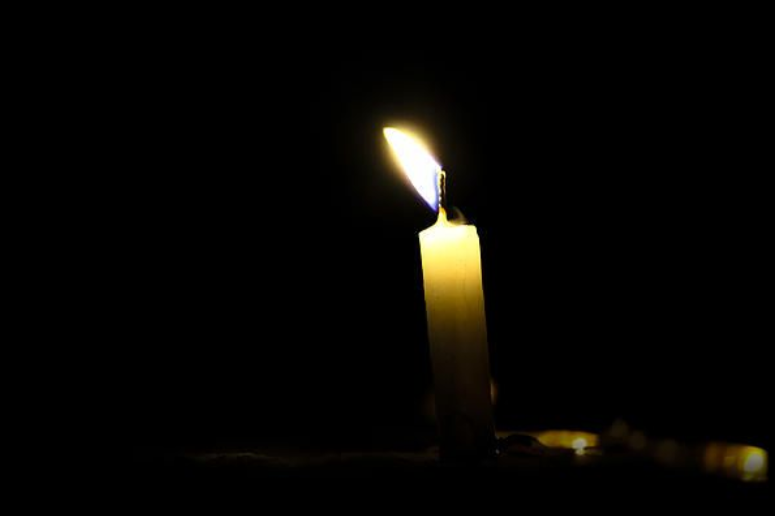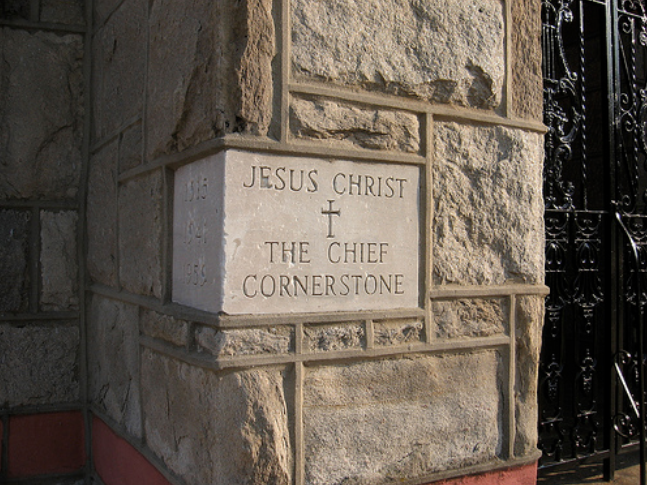Editor’s note: The following is extracted from Discipline and Other Sermons, by Charles Kingsley (published 1881). All spelling in the original.

You may see, if you will read your Bible, that the night is spoken of in the Old Testament much as we speak of it now, as a beautiful and holy thing. The old Jews were not afraid of any terror by night. They rejoiced to consider the heavens, the work of God’s fingers, the moon and the stars, which he had ordained. They looked on night, as we do, as a blessed time of rest and peace for men, in which the beasts of the forest seek their meat from God, while all things are springing and growing, man knows not how, under the sleepless eye of a good and loving Creator.
But, on the other hand, you may remark that St. Paul, in his Epistles, speaks of night in a very different tone. He is always opposing night to day, and darkness to light; as if darkness was evil in itself, and a pattern of all evil in men’s souls. And St. Paul knew what he was saying, and knew how to say it; for he spoke by the Holy Spirit of God.
The reason of this difference is simple. The old Jews spoke of God’s night, such as we country folks may see, thank God, as often as we will. St. Paul spoke of man’s night, such as it might be seen, alas! in the cities of the Roman empire. All those to whom he wrote—Romans, Corinthians, Ephesians, and the rest—dwelt in great cities, heathen and profligate; and night in them was mixed up with all that was ugly, dangerous, and foul. They were bad enough by day: after sunset, they became hells on earth. The people, high and low, were sunk in wickedness; the lower classes in poverty, and often despair. The streets were utterly unlighted; and in the darkness robbery, house-breaking, murder, were so common, that no one who had anything to lose went through the streets without his weapon or a guard; while inside the houses, things went on at night—works of darkness—of which no man who knows of them dare talk. For as St. Paul says, ‘It is a shame even to speak of those things which are done by them in secret.’ Evil things are done by night still, in London, Paris, New York, and many a great city; but they are pure, respectable, comfortable, and happy, when compared with one of those old heathen cities, which St. Paul knew but too well.
Again. Our own forefathers were afraid of the night and its terrors, and looked on night as on an ugly time: but for very different reasons from those for which St. Paul warned his disciples of night and the works of darkness. Though they lived in the country, they did not rejoice in God’s heaven, or in the moon and stars which he had ordained. They fancied that the night was the time in which all ghastly and ugly phantoms began to move; that it was peopled with ghosts, skeletons, demons, witches, who held revels on the hill-tops, or stole into houses to suck the life out of sleeping men. The cry of the wild fowl, and the howling of the wind, were to them the yells of evil spirits. They dared not pass a graveyard by night for fear of seeing things of which we will not talk. They fancied that the forests, the fens, the caves, were full of spiteful and ugly spirits, who tempted men to danger and to death; and when they prayed to be delivered from the perils and dangers of the night, they prayed not only against those real dangers of fire, of robbers, of sudden sickness, and so forth, against which we all must pray, but against a thousand horrible creatures which the good God never created, but which their own fancy had invented.
Now in the Bible, from beginning to end, you will find no teaching of this kind. That there are angels, and that there are also evil spirits, the Bible says distinctly; and that they can sometimes appear to men. But it is most worthy of remark how little the Bible says about them, not how much; how it keeps them, as it were, in the background, instead of bringing them forward; while our forefathers seem continually talking of them, continually bringing them forward—I had almost said they thought of nothing else. If you compare the Holy Bible with the works which were most popular among our forefathers, especially among the lower class, till within the last 200 years, you will see at once what I mean,—how ghosts, apparitions, demons, witchcraft, are perpetually spoken of in them; how seldom they are spoken of in the Bible; lest, I suppose, men should think of them rather than of God, as our forefathers seem to have been but too much given to do.
And so with this Psalm. It takes for granted that men will have terrors by night; that they will be at times afraid of what may come to them in the darkness. But it tells them not to be afraid, for that as long as they say to God, ‘Thou art my hope and my stronghold; in thee will I trust,’ so long they will not be afraid for any terror by night.
It was because our forefathers did not say that, that they were afraid, and the terror by night grew on them; till at times it made them half mad with fear of ghosts, witches, demons, and such-like; and with the madness of fear came the madness of cruelty; and they committed, again and again, such atrocities as I will not speak of here; crimes for which we must trust that God has forgiven them, for they knew not what they did.
But, though we happily no longer believe in the terror by night which comes from witches, demons, or ghosts, there is another kind of terror by night in which we must believe, for it comes to us from God, and should be listened to as the voice of God: even that terror about our own sinfulness, folly, weakness which comes to us in dreams or in sleepless nights. Some will say, ‘These painful dreams, these painful waking thoughts, are merely bodily, and can be explained by bodily causes, known to physicians.’ Whether they can or not, matters very little to you and me. Things may be bodily, and yet teach us spiritual lessons. A book—the very Bible itself—is a bodily thing: bodily leaves of paper, printed with bodily ink; and yet out of it we may learn lessons for our souls of the most awful and eternal importance. And so with these night fancies and night thoughts. We may learn from them. We are forced often to learn from them, whether we will or not. They are often God’s message to us, calling us to repentance and amendment of life. They are often God’s book of judgment, wherein our sins are written, which God is setting before us, and showing us the things which we have done.
Who that has come to middle age does not know how dreams sometimes remind him painfully of what he once was, of what he would be still, without God’s grace? How in his dreams he finds himself tempted by the old sins; giving way to the old meannesses, weaknesses, follies? How dreams remind him, awfully enough, that though his circumstances have changed,—his opinions, his whole manner of life, have changed—yet he is still the same person that he was ten, twenty, thirty, forty years ago, and will be for ever? Nothing bears witness to the abiding, enduring, immortal oneness of the soul like dreams when they prove to a man, in a way which cannot be mistaken—that is, by making him do the deed over again in fancy—that he is the same person who told that lie, felt that hatred, many a year ago; and who would do the same again, if God’s grace left him to that weak and sinful nature, which is his master in sleep, and runs riot in his dreams. Whether God sends to men in these days dreams which enable them to look forward, and to foretell things to come, I cannot say. But this I can say, that God sends dreams to men which enable them to look back, and recollect things past, which they had forgotten only too easily; and that these humbling and penitential dreams are God’s warning that (as the Article says) the infection of nature doth remain, even in those who are regenerate; that nothing but the continual help of God’s Spirit will keep us from falling back, or falling away.
Again: those sad thoughts which weigh on the mind when lying awake at night, when all things look black to a man; when he is more ashamed of himself, more angry with himself, more ready to take the darkest view of his own character and of his own prospects of life, than he ever is by day,—do not these thoughts, too, come from God? Is it not God who is holding the man’s eyes waking? Is it not God who is making him search out his own heart, and commune with his spirit? I believe that so it is. If any one says, ‘It is all caused by the darkness and silence. You have nothing to distract your attention as you have by day, and therefore the mind becomes unwholesomely excited, and feeds upon itself,’ I answer, then they are good things, now and then, this darkness and this silence, if they do prevent the mind from being distracted, as it is all day long, by business and pleasure; if they leave a man’s soul alone with itself, to look itself in the face, and be thoroughly ashamed of what it sees. In the noise and glare of the day, we are all too apt to fancy that all is right with us, and say, ‘I am rich, and increased with goods, and have need of nothing;’ and the night does us a kindly office if it helps us to find out that we knew not that we were poor, and miserable, and blind, and naked—not only in the sight of God, but in our own sight, when we look honestly at ourselves.
The wise man says:—
‘Oh, would some power the gift but give us,
To see ourselves as others see us!’
and those painful thoughts make us do that. For if we see some faults in ourselves, be sure our neighbours see them likewise, and perhaps many more beside.
But more: these sad thoughts make us see ourselves as God sees us. For if we see faults in ourselves, we may be sure that the pure and holy God, in whose sight the very heavens are not clean, and who charges his angels with folly, sees our faults with infinitely greater clearness, and in infinitely greater number. So let us face those sad night thoughts, however painful, however humiliating they may be; for by them God is calling us to repentance, and forcing us to keep Lent in spirit and in truth, whether we keep it outwardly or not.
‘What,’ some may say, ‘you would have us, then, afraid of the terror by night?’ My dear friends, that is exactly what I would not have. I would teach you from Holy Scripture how to profit by the terror, how to thank God for the terror, instead of being afraid of it, as you otherwise certainly will be. For these ugly dreams, these sad thoughts do come, whether you choose or not. Whether you choose or not, you all have, or will have seasons of depression, of anxiety, of melancholy. Shall they teach you, or merely terrify you? Shall they only bring remorse, or shall they bring repentance?
Remorse. In that is nothing but pain. A man may see all the wrong and folly he has done; he may fret over it, torment himself with it, curse himself for it, and yet be the worse, and not the better, for what he sees. If he be a strong-minded man, he may escape from remorse in the bustle of business or pleasure. If he be a weak-minded man, he may escape from it in drunkenness, as hundreds do; or he may fall into melancholy, superstition, despair, suicide.
But if his sadness breeds, not remorse, but repentance—that is, in one word, if instead of keeping his sins to himself, he takes his sins to God—then all will be well. Then he will not be afraid of the terror, but thankful for it, when he knows that it is what St. Paul calls, the terror of the Lord.
This is why the old Psalmists were not afraid of the terror by night; because they knew that their anxiety had come from God, and therefore went to God for forgiveness, for help, for comfort. Therefore it is that one says, ‘I am weary of groaning. Every night wash I my bed, and water my couch with my tears,’ and yet says the next moment, ‘Away from me, all ye that work vanity. The Lord hath heard the voice of my weeping. The Lord will receive my prayer.’
Therefore it is that another says, ‘While I held my sins my bones waxed old through my daily complaining;’ and the next moment—‘I said I will confess my sins unto the Lord, and so thou forgavest the wickedness of my sin.’
Therefore it is that again another says, ‘Thou holdest mine eyes waking. I am so feeble that I cannot speak. I call to remembrance my sin, and in the night season I commune with my heart, and search out my spirit. Will the Lord absent himself for ever, and will he be no more entreated? Is his mercy clean gone for ever, and his promise come utterly to an end for evermore? And I said, It is mine own infirmity; but I will remember the years of the right hand of the most Highest. I will remember the works of the Lord, and call to mind the wonders of old.’
And another, ‘Why art thou so heavy, O my soul, and why art thou so disquieted within me? O put thy trust in God, for I shall yet give him thanks, who is the help of my countenance, and my God.’
And therefore it is, that our Lord Jesus Christ, in order that he might taste sorrow for every man, and be made in all things like to his brethren, endured, once and for all, in the garden of Gethsemane, the terror which cometh by night, as none ever endured it before or since; the agony of dread, the agony of helplessness, in which he prayed yet more earnestly, and his sweat was as great drops of blood falling down to the ground. And there appeared an angel from heaven strengthening him; because he stood not on his own strength, but cast himself on his Father and our Father, on his God and our God. So says St. Paul, who tells us how our Lord, in the days of his flesh, when he had offered up prayers and supplications, with strong crying and tears, unto him that was able to save him from death, and was heard in that he feared—though he were a son, yet learned he obedience by the things which he suffered; and being made perfect, he became the Author of everlasting salvation unto all them that obey him.
Oh, may we all, in the hour of shame and sadness, in the hour of darkness and confusion, and, above all, in the hour of death and the day of judgment, take refuge with him in whom alone is help, and comfort, and salvation for this life and the life to come—even Jesus Christ, who died for us on the cross.









